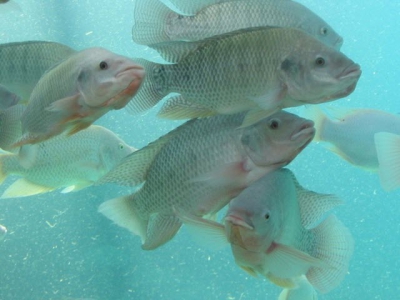Essential oils and parasite control in aquaculture

Parasite control in aquaculture is becoming a major end goal of feed additive R&D, says a researcher.
Dr Benedict Standen, product manager at Austrian feed additives producer, Biomin, was talking about the benefits of essential oils in fish at Aqua 2018 in Montpellier last month.
We caught up him at the event to hear more about what is on the horizon for the Austrian company in terms of additives targeted at farmed fish.
While FCR and digestibility enhancement has long been on Biomin’s positioning focus in relation to its Digesterom line for aquaculture, it is widening the application range for that technology.
“We are always trying to develop new products, we are always screening new essential oils, and everything starts in the lab in vitro. If we find interesting compounds, we then, of course, test them in vivo.”
However, Biomin is now looking more and more at how it can use essential oils or phytogenics against parasites in farmed fish production, he said.
“We are seeing a high prevalence of parasites in the industry. Parasites, obviously, can cause direct negative effects in the fish but also they can be also be a vector for secondary bacterial infections as well.”
The company, he said, is trying to take a prophylactic approach to control parasites, both endoparasites and ectoparasites.
“We have a few projects under development. We are working in Mediterranean fish, in salmon and in tilapia against specific parasites in these species. We are trying to cover the Mediterranean, Asian and Latin American regions as well.
“At the moment, we cannot make strong claims or conclusions [in relation to parasite control] but we do know that phytogenics can help with gut barrier function, they can help with mucus production, and, of course, this also suggests they help with the parasite loading as well. But we have some more work to do on this.”
One Biomin led trial is underway in this respect, and a few other trials with commercial partners are in the pipeline, added Standen.
“Hopefully, by December 2018, we will have a lot more data to support these claims.”
Biomin’s parasite control research work is leveraging the company’s Digesterom PEP MGE technology; the product is based on a mixture of essential oils including oregano oil, anise oil and citrus oil.
“Although it is just one product, it draws on mode of action from three different oils, and, of course, there is the MGE carrier for heat stability so we can ensure the essential oils are not destroyed during the extrusion process.”
Essential oils in fish production
In a review published last year in the journal, Reviews in Aquaculture, the authors said it was evident that plant essential oils (EOs) and their components can affect physiological functions and modulate the intestinal microbiota of different animal species, showing potential to be used as growth and health-promoting agents in fish production.
However, they said in vivo effects of dietary treatment with EOs or their isolated compounds on fish health are controversial. Determinant for a particular activity is the chemical composition of the EO; that is, depending on the active substances contained in the oil, a specific biological effect can be observed. In addition, the effects largely depend on many different factors from the extraction process to the concentration and method of application of the additives as well as their storage conditions prior to feeding.
The authors concluded that further trials were needed to gain more insights into the modes of action of various Eos, their impact on pathogenic microorganisms and the more abundant normal microbiota of the gut. They also urged further evaluation of the impact of EOs on the environment and the host.
“In addition, because of the chemical diversity and interactions among the individual constituents, the use of EOs or blends may have greater effects than a single isolated molecule due to the diversity of potential action sites.
“The ingredients and the diet manufacturing process may interfere with the stability/quality of EOs and thus may influence their effects on fish health and their activity on microbiota of the GI tract of fish. Consequently, the encapsulation process or any process capable of protecting the EOs may be a viable alternative to improve their stability, protecting them against interactions with the host, food ingredients, and environment, and potentially ensuring their activity as health promoters of the GI tract and increase the reliability and predictability of the actions.”
Related news
 Columnaris Disease
Columnaris Disease Columnaris, first described by Herbert Spencer Davis in 1922, is one of the oldest known diseases of warm water fish. References to the disease can be confusing
 Bee glue, aloe supplement may boost tilapia survival from disease challenge
Bee glue, aloe supplement may boost tilapia survival from disease challenge A blended supplement of natural extracts may support the survival and immune functioning of tilapia facing a disease challenge, say researchers.
 Nutriad looks to boost survival, FCR and fish health as disease ups the stakes in tilapia
Nutriad looks to boost survival, FCR and fish health as disease ups the stakes in tilapia Nutriad looks to boost survival, FCR and fish health as disease ups the stakes in tilapia production